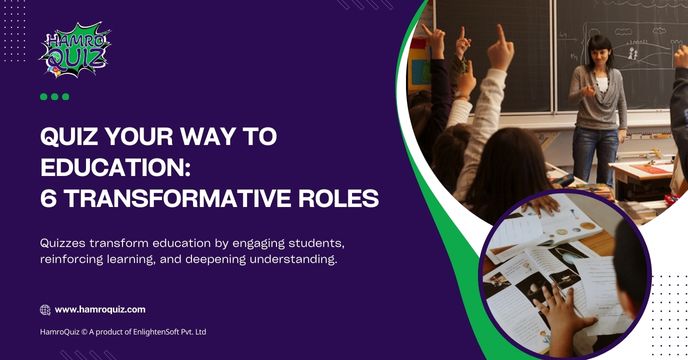
Quiz Your Way to Education: 6 Transformative Roles
Why to Implement Quiz in Education?
In the dynamic field of education, teachers are continuously rethinking traditional teaching approaches to boost student engagement, understanding, and memory. One widely adopted strategy in recent times is the quiz. While often seen as just an assessment tool, quizzes offer significant educational benefits beyond evaluation. This blog looks into the multifaceted role of quizzes in creating a more captivating and impactful learning environment.
Importance of Quiz In Education
-
Engagement and Motivation: Igniting Curiosity Through Interactive Quizzing:
Quizzes enhance student involvement by capturing their attention and encouraging active teaching. It facilitates a dynamic teaching environment by converting passive information consumption into engaging activities that spark their natural thirst for knowledge. High scores and completion rates foster learners' sense of accomplishment and confidence. It empowers them to monitor their progress over time, promoting self-assurance and a sense of achievement due to their progressive nature.
Example:In a class of Nepalese artwork, students can take tests covering a wide range of artistic disciplines, such as architecture, woodcarving, painting, and sculpting. They can be tested to identify the architectural style of historical and religious places like Swayambhunath, Pashupati Temple, and Krishna Mandir. They'll feel more at ease answering questions on certain architectural styles in the future because they've already completed the quiz and have a better memory of the subject matter.
-
Formative Assessment and Learning Progression:
With regular assessments like quizzes, teachers gain valuable insights into their pupils' understanding. This allows them to provide timely support and tailor instruction to each one of their specific needs. By constantly evaluating and adjusting lessons based on student progress and areas of difficulty, teachers create a responsive learning experience that meets the individual needs of all of them, fostering a diverse and effective classroom environment.
Example: In a Newari language class, learners take weekly tests to record their progress. Each one receives similar questions, such as "What is your name" or "How do you say 'home' in Newari." If all students answer correctly, the teacher knows the lessons taught are well understood. However, if many of them struggle with these basic questions, the teacher can adjust the lesson plan or focus support on those who need it. This approach helps identify areas where students may need extra help, enabling teachers to effectively guide all of them and ensure they progress at the same pace.
-
Reinforcing Learning and Retention: Cementing Knowledge Through Retrieval Practice:
Tests are a vital tool for emphasizing learning goals and aiding in the memorizing of key ideas covered in the classroom. Recalling and analyzing previously taught material strengthens retention strategies and prevents pupils' knowledge from progressively deteriorating from forgetting. It can also establish connections between other topics, encouraging a thorough comprehension of the material. Quizzes are a useful technique for making sure that information is maintained since they provide retrieval practice and repetition. Over time, it helps learners remember important concepts.
Example: For the SEE exam, students have to study a wide range of topics, which could make them forget what they have already studied. Therefore, Teachers can take quizzes on content that pupils have previously learned. This saves them from having to read the entire book and helps them recall the content even if they have forgotten it. It is a simple, entertaining way to learn and remember information for a longer amount of time.
-
Promoting Active Learning:
Quizzes promote active learning by requiring students to process information rather than passively receiving it. Unlike reading books or listening to lectures, tests demand that they apply concepts, recall knowledge, and solve problems rapidly. This active involvement strengthens memory and deepens understanding by engaging the mind. Reflective quizzing techniques foster critical thinking skills, enhancing intellectual growth and empowering them to move beyond rote memorization.
Example: In a business class, students take individual tests covering concepts like Maslow's Hierarchy of Needs. Afterward, they engage in group discussions where they share their answers and thoughts. These collaborative sessions allow them to deepen their understanding, learn from others, and clarify crucial concepts. By exchanging perspectives and listening to each other's insights, students gain a more comprehensive grasp of the subject material, which helps in retaining the knowledge they've acquired.
-
Concentration and Revision Aid:
Quizzes are an essential tool for enhancing concentration and assisting with revision. Targeted topic evaluations, which require pupils to focus on specific academic subjects, improve their ability to concentrate and recall information. Moreover, it serves as a useful revision tool and motivates them to review and enhance their understanding of the material before exams. It is beneficial for pupils who can't review the entire book the day before an exam. Additionally, they can choose to take tests in subjects that they find challenging. These are far more beneficial for remembering than reading an entire book because they will help them go over the important ideas again.
Example: The LokSewa tests are among the hardest to pass because there are thousands of applicants and only a small number of seats available. Since tests can cover a lot of content, they can be quite beneficial in helping pupils study for the Loksewa test. It can help them focus and remember the content they have already studied. If they answer every question accurately, they can feel secure; if not, they can always go back to the incorrectly answered question and figure out where they went wrong before the test.
-
Immediate Feedback and Remediation:
Quizzes provide instant feedback, enabling pupils to see their performance strengths and weaknesses right away. They will recognize their mistakes and receive accurate answers, clarifying incorrect responses immediately. This helps them improve, retain, and understand the subject matter more clearly. By using this feedback, learners can pinpoint areas needing extra attention and take responsibility for their learning.
Example: Pupils commonly face challenges in remembering historical dates during quizzes. They may resort to guessing, often leading to incorrect answers. However, immediate feedback after selecting wrong answers is crucial. By displaying the correct response promptly, the quiz helps them acknowledge their mistake, which helps them avoid similar mistakes in the future. Timely feedback is essential for effective learning and memory retention.
Empowering Learners Through the Transformative Power of Quizzing
Quizzes are incredibly useful tools that encourage pupils to participate actively, give immediate feedback, assist in continuous improvement, reinforce learning objectives, and build self-confidence in them. Teachers may design engaging and productive learning experiences that enable students to thrive academically and beyond by introducing quizzes into their lesson plans.
